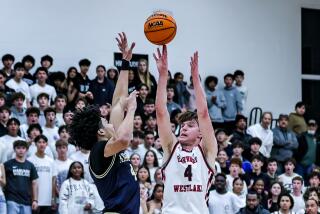Another Bad Year for Whine
- Share via
Baseball practice officially began last week. Or, as it inevitably becomes at many schools, the season of discontent.
Although the voices are often hushed and the playing field serene, baseball gives rise to more complaining and second-guessing by parents than any sport.
The coach, of course, bears the brunt of the bleating.
And this is someone who has a thankless enough job. Besides teaching kids the game, the coach serves as groundskeeper, fund-raiser and college guidance counselor.
Oh, and his lineup had better pass the scrutiny of every parent or there will be hell to pay, presumably at a rate greater than the five bucks an hour or so a coach makes.
Few, if any, area baseball programs are devoid of parental meddling. Wander out to a field and listen up. You’ll come away believing the national pastime is to rip, rip, rip on the home coach.
Coaches in other sports are insulated from much of the griping. A measure of military-style protocol is present in football programs. And parents are wary of saying too much when the coach can use their son as a human tackling dummy from that day forward.
Basketball coaches face more problems. A parent recently requested that we send a reporter to a game, “so we can say in the paper what a circus the team is.”
We didn’t need to see the game to identify the clown, and it isn’t a coach or player. But usually a basketball coach can avoid serious problems simply by playing the tall kids who can shoot.
Baseball poses more difficulties for a coach and more opportunities for parents to intrude.
Skills are subjective, so much so that major league scouts often disagree on who the best players are. The slow pace and small stands invite discussion that leads to gossip that leads to complaining ad nauseam.
Coaches get it for sticking with the same lineup and they get it for making changes. They get it for giving seniors first shot at jobs, and they get it for promoting sophomores and freshmen.
They get it for being too tough, they get it for being pushovers.
They get it for being honest about a player’s college potential. (Parent alert: Baseball is a nonrevenue college sport and each school is allowed only 11.7 scholarships, so the chance of your son getting a full ride is barely a blip above zero).
Baseball coaches must resort to fund-raising gimmicks that would make a used-car salesman in a plaid sport coat blush, and they get it for that, too. But it’s the only way to pay for the high-quality facilities, equipment and uniforms parents expect for their kids.
As for the coach’s uniform, it doesn’t include a suit of armor to fend off the slings and arrows of outraged parents.
But it probably should.
*
Non-contact sport: It was noted recently in this space that many area baseball coaches routinely violate the Southern Section rule prohibiting contact with players during off-season weekend games.
Coaches attending these contests, which are scheduled by the coaches and ostensibly run by parents, often cannot resist the temptation to talk with players on the field and in the bullpen.
However, there is a strong movement, led by many coaches and supported by scouts who want to see top players develop their skills, to scrap the rule and allow coaches to run off-season teams from the dugout.
The Southern Section executive council will study the rule at its March 13 meeting.
“We think maybe we are ready to support change in the rule,” said Bill Clark, a Southern Section administrator. “There are valid points on both sides. That’s what makes it an interesting discussion.”
Those in favor of keeping the rule fall into two camps:
Baseball coaches who also coach other sports in the fall or winter believe they will be at a disadvantage if their colleagues who coach only baseball are allowed to coach their teams year-around.
Also, many parents and athletes--and even a few coaches--believe players need a break from their high school coach at some point during the year.
Clark counts himself among this group. He also believes that year-round programs will discourage athletes from playing more than one sport.
“The rule is in place to maintain the integrity of our season of sport,” Clark said. “Without it, kids play one sport for one coach, spring, winter and fall.
“Some coaches and players like the rule because, hey, they have lives, and they’d like to do something other than spend the entire year on the baseball field without feeling like somebody else is gaining an advantage.
“But there is another significant percentage who believe we have an obligation to make kids the best players they can be.”
More to Read
Get our high school sports newsletter
Prep Rally is devoted to the SoCal high school sports experience, bringing you scores, stories and a behind-the-scenes look at what makes prep sports so popular.
You may occasionally receive promotional content from the Los Angeles Times.







